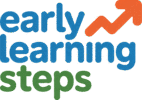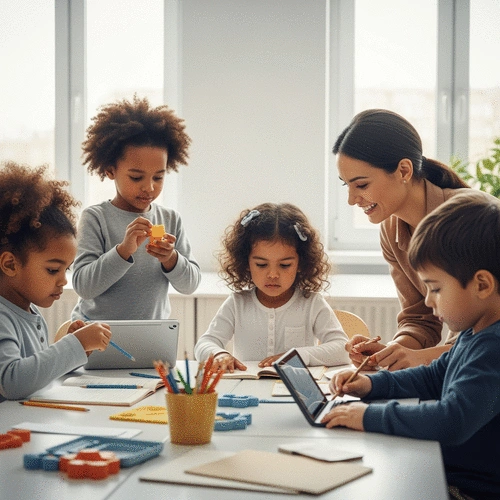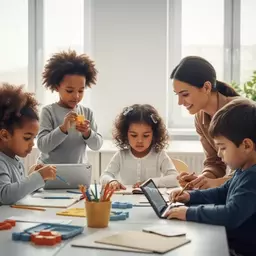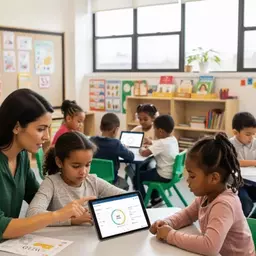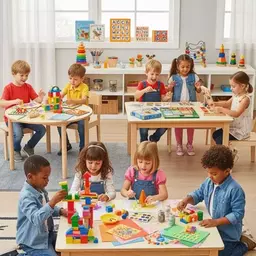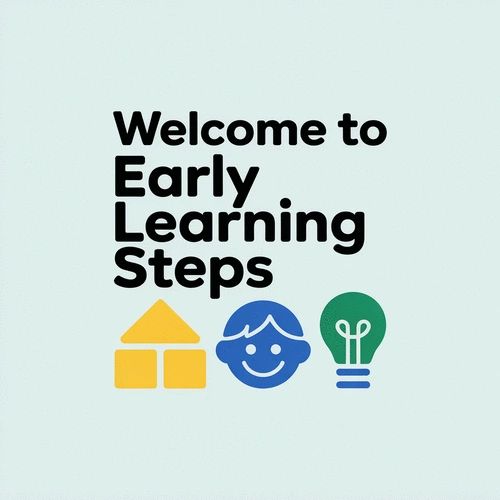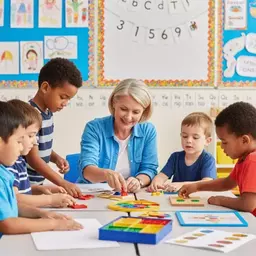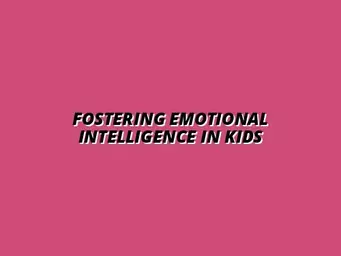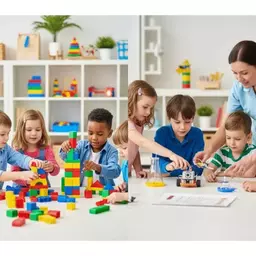In the rapidly changing world of early education, how prepared are we to adapt? As we approach 2025, understanding the latest curriculum innovations is crucial for fostering confident, curious learners.
What You Will Learn
- How technology, including AI and AR/VR, enhances personalized learning experiences.
- The importance of play-based learning in cultivating creativity and problem-solving skills.
- Strategies for addressing children's social-emotional needs through innovative curricula.
- The benefits of adopting holistic development strategies that cover physical, emotional, and cognitive growth.
- Ways to enhance parental involvement to create a strong home-school connection.
Key Innovations Shaping Early Learning by 2025
Curriculum innovations are transforming early education, focusing on engaging and effective learning environments. Below are key areas driving this evolution.
Integrating Technology
- •AI for personalized learning
- •AR/VR for immersive experiences
- •Adaptive learning tools
Post-Pandemic Changes
- •Flexible learning environments
- •Blended in-person/remote education
- •Prioritizing safety & well-being
Key Takeaways & Strategies
- •Embrace technology
- •Focus on play-based learning
- •Prioritize social-emotional learning
- •Holistic development
Preparation for the Future
- •Stay informed on research/trends
- •Participate in workshops
- •Explore online resources
- •Engage with educators/parents
Understanding the Shift in Early Learning: Emerging Curriculum Innovations for 2025
The landscape of early education is evolving, and it’s essential for parents and teachers to stay informed about these changes. Curriculum innovations are not just buzzwords; they represent a shift towards more engaging, effective learning environments for our children. As we approach 2025, understanding these innovations is critical in nurturing confident and curious learners.
At Early Learning Steps, I believe that curriculum innovations matter profoundly because they directly impact how children learn and grow. They provide an opportunity to create enriching experiences that cater to the diverse needs of our young learners, fostering creativity and emotional intelligence.
Why Curriculum Innovations Matter to Parents and Teachers
As parents and educators, we share the responsibility of guiding our children through their formative years. Innovations in curriculum can make this journey more effective and enjoyable! They help us adapt to the changing educational landscape and better support our children’s development.
- Enhances engagement and motivation in learning.
- Cultivates critical thinking and problem-solving skills.
- Supports individualized learning experiences.
- Addresses the emotional and social needs of children.
By focusing on these aspects, we can create an environment where every child feels empowered to explore and discover their potential!
Post-Pandemic Changes: The New Normal in Early Education
The pandemic has undeniably reshaped education, revealing the need for adaptability and resilience. In the face of these challenges, early childhood education has responded with innovative curriculum changes that prioritize safety, engagement, and emotional well-being.
New approaches now include flexible learning environments that blend in-person and remote educational experiences. This adaptation not only supports safety but also allows for more personalized learning paths for children. Have you noticed how these shifts have impacted your child’s learning experience?
Innovations Shaping Early Learning Experiences
With each passing year, we witness remarkable innovations that are reshaping early learning. These changes are not just about technology; they also emphasize the importance of play, social-emotional learning, and holistic development. In this section, we’ll explore some of the most exciting innovations that are making a difference in our classrooms and homes.
Integrating Technology: AI, AR/VR, and Adaptive Learning Tools
Technology is becoming an integral part of early education. Tools like artificial intelligence (AI) and augmented/virtual reality (AR/VR) are paving new paths for interactive and personalized learning experiences.
- AI can adapt learning materials to suit each child's pace.
- AR/VR can immerse children in new worlds, enhancing their understanding of complex concepts.
- Adaptive learning tools allow for personalized education tailored to individual needs.
As an advocate for innovative learning strategies, I see these technologies as valuable allies in our quest to foster curiosity and creativity in children.
How AI is Revolutionizing Personalized Learning
AI is more than just a trend; it’s a powerful tool that can offer tailored learning experiences. By analyzing a child’s progress, AI can provide customized activities and assessments that cater to their unique learning style.
This approach not only boosts confidence but also promotes a love for learning. Imagine your child engaging in lessons that feel just right for them—exciting, isn’t it?
Augmented and Virtual Reality: Expanding Learning Beyond the Classroom
AR and VR technologies transport children to places they may never visit in real life. Using these tools, children can explore the ocean depths, travel back in time, or even experience outer space—all from the comfort of their classroom or home!
These immersive experiences foster engagement and excitement, making learning feel like an adventure. What a fantastic way to spark imagination and curiosity!
Interactive Poll: Your Thoughts on Curriculum Innovations
As we explore the exciting world of curriculum innovations, we want to know your perspective! How do you feel about the integration of technology in early education? Share your thoughts by selecting one of the options below:
Frequently Asked Questions about Early Learning Innovations
- What are the key curriculum innovations for early learning by 2025?
- Key innovations include integrating technology like AI and AR/VR for personalized learning, emphasizing play-based learning, prioritizing social-emotional development, adopting holistic development strategies, and enhancing parental involvement.
- How does technology enhance early learning?
- Technology, such as AI and AR/VR, allows for personalized learning experiences by adapting materials to a child's pace, immersing them in interactive environments, and providing tailored educational tools.
- Why is play-based learning important?
- Play-based learning is crucial for fostering creativity, critical thinking, and problem-solving skills in young children, making learning engaging and effective.
- What is the impact of post-pandemic changes on early education?
- Post-pandemic changes have led to more flexible learning environments, including blended in-person and remote education, with an increased focus on safety, engagement, and children's emotional well-being.
- How can parents and educators prepare for these emerging innovations?
- Preparation involves staying informed about research and trends, participating in workshops, exploring online resources, and engaging with other parents and educators to share insights and experiences.
Summarizing Key Takeaways for Parents and Educators
As we look toward the future of early learning in 2025, it’s crucial to recognize how curriculum innovations are reshaping the educational landscape. Parents and educators alike must embrace these changes to foster environments where children can thrive. Together, we can cultivate a generation of confident and curious learners who are well-equipped to navigate their world!
Here are some key takeaways to keep in mind:
- Embrace technology: Integrating tools like AI and VR into early education can enhance learning experiences.
- Focus on play-based learning: This approach nurtures creativity and problem-solving skills in young children, as highlighted in our discussion on play-based learning and cognitive growth.
- Prioritize social-emotional learning: Developing emotional intelligence is vital for children’s overall success.
- Adopt holistic development strategies: Addressing physical, emotional, and cognitive growth is essential in curriculum design.
- Enhance parental involvement: Building strong home-school connections fosters community and enriches children’s learning.
Embracing Change: The Future of Early Learning in 2025
The landscape of early learning is rapidly evolving. As a passionate advocate for child development, I have witnessed firsthand how embracing these innovations can lead to enhanced learning outcomes. We need to view these changes not as challenges, but as opportunities for growth. By integrating new approaches in our classrooms and homes, we can better support our children’s emotional and cognitive needs.
What’s even more exciting is the potential for new teaching methods to resonate with our kiddos in a meaningful way. Open-mindedness and creativity must be at the forefront of our strategies as we navigate this new normal together!
Next Steps: How to Prepare for Emerging Curriculum Innovations
Preparation is key in embracing these emerging curriculum innovations. As parents and educators, we can take several proactive steps to ensure we are ready for the changes ahead:
- Stay informed about the latest research and trends in early education.
- Participate in workshops and training sessions focused on new teaching methodologies.
- Explore online resources that offer insights and strategies for implementing innovative curriculum.
- Engage with other parents and educators to share experiences and insights.
By taking these steps, we can enhance our own understanding and better equip our children for the exciting learning journeys that lie ahead!
Encouraging Ongoing Dialogue and Engagement
At Early Learning Steps, we believe that continuous dialogue is vital for fostering a supportive community for parents and educators. By sharing insights and experiences, we can collaboratively navigate the evolving landscape of early education.
Sharing Insights: Community Conversations on Curriculum Innovations
Encouraging open conversations about curriculum innovations is a great way to keep everyone informed and engaged. By discussing challenges and successes, we can learn from one another’s experiences. In our community, I often invite parents and educators to share their stories and insights. What are your thoughts on the innovations you’ve noticed in your child’s learning environment?
Getting Involved: Resources for Parents and Teachers to Stay Informed
To stay informed about the latest trends and resources, consider engaging with the following:
- Webinars and online courses: These can provide valuable insights into new teaching methods.
- Educational blogs and newsletters: Many platforms offer expert advice and tips on early education.
- Local parent cooperatives: Connecting with fellow parents can foster collaboration and support.
Staying engaged with these resources helps us cultivate a deeper understanding of how to support our children's learning journeys.
Digital Tools for Learning: Engaging Families in Early Education
In our increasingly digital world, leveraging digital tools can enhance learning experiences and communication between home and school. Tools like learning apps and online platforms can provide interactive and engaging ways to reinforce what children are learning in the classroom. Have you explored any digital tools that have made a positive impact in your family's learning environment? By embracing these innovations, we can ensure our children are receiving the best support possible as they grow and learn! For more insights into fostering positive emotions, check out our article on nurturing emotional intelligence at home.
Recap of Key Points
Here is a quick recap of the important points discussed in the article:
- Embrace technology: Integrating tools like AI and VR into early education can enhance learning experiences.
- Focus on play-based learning: This approach nurtures creativity and problem-solving skills in young children.
- Prioritize social-emotional learning: Developing emotional intelligence is vital for children’s overall success.
- Adopt holistic development strategies: Addressing physical, emotional, and cognitive growth is essential in curriculum design.
- Enhance parental involvement: Building strong home-school connections fosters community and enriches children’s learning.
